Report on Emotional Intelligence in Nursing Leadership, University
VerifiedAdded on 2022/08/16
|6
|977
|15
Report
AI Summary
This report examines the significance of emotional intelligence (EQ) in nursing leadership. It emphasizes the importance of EQ for effective patient care, patient satisfaction, and building strong nurse-patient relationships. The report discusses the importance of self-awareness for nurse leaders, including maintaining records of their actions and analyzing their performance. It also addresses strategic planning in healthcare, including the need for setting long-term goals, improving communication, and identifying areas for improvement. The report highlights the factors affecting future planning in healthcare and tools like SWOT analysis, visioning, and the VRIO framework. The conclusion underscores the priority of developing emotional intelligence and self-awareness among nurse leaders to ensure efficient patient care and positive outcomes. The report also includes several references to support the findings.
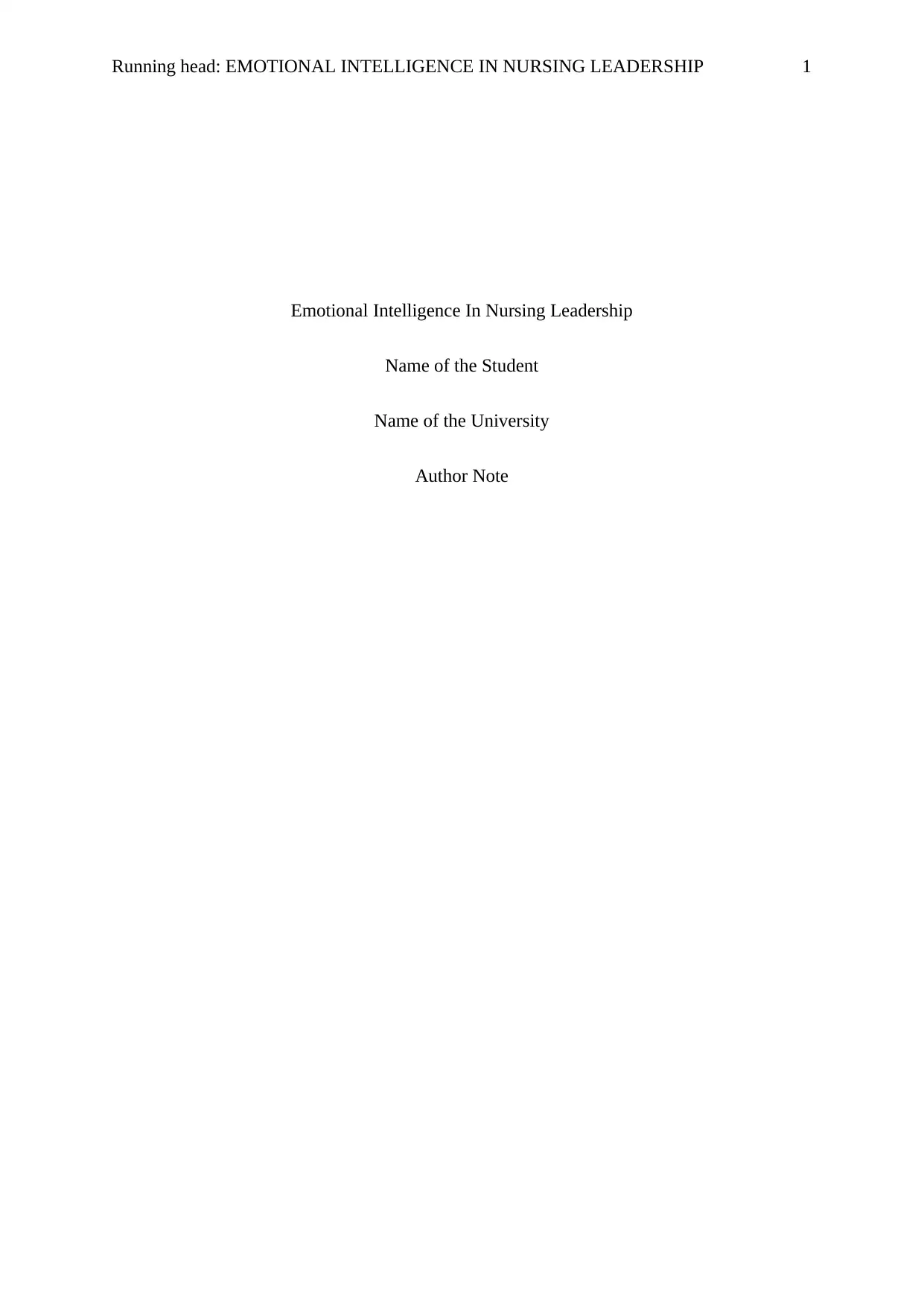
Running head: EMOTIONAL INTELLIGENCE IN NURSING LEADERSHIP 1
Emotional Intelligence In Nursing Leadership
Name of the Student
Name of the University
Author Note
Emotional Intelligence In Nursing Leadership
Name of the Student
Name of the University
Author Note
Paraphrase This Document
Need a fresh take? Get an instant paraphrase of this document with our AI Paraphraser
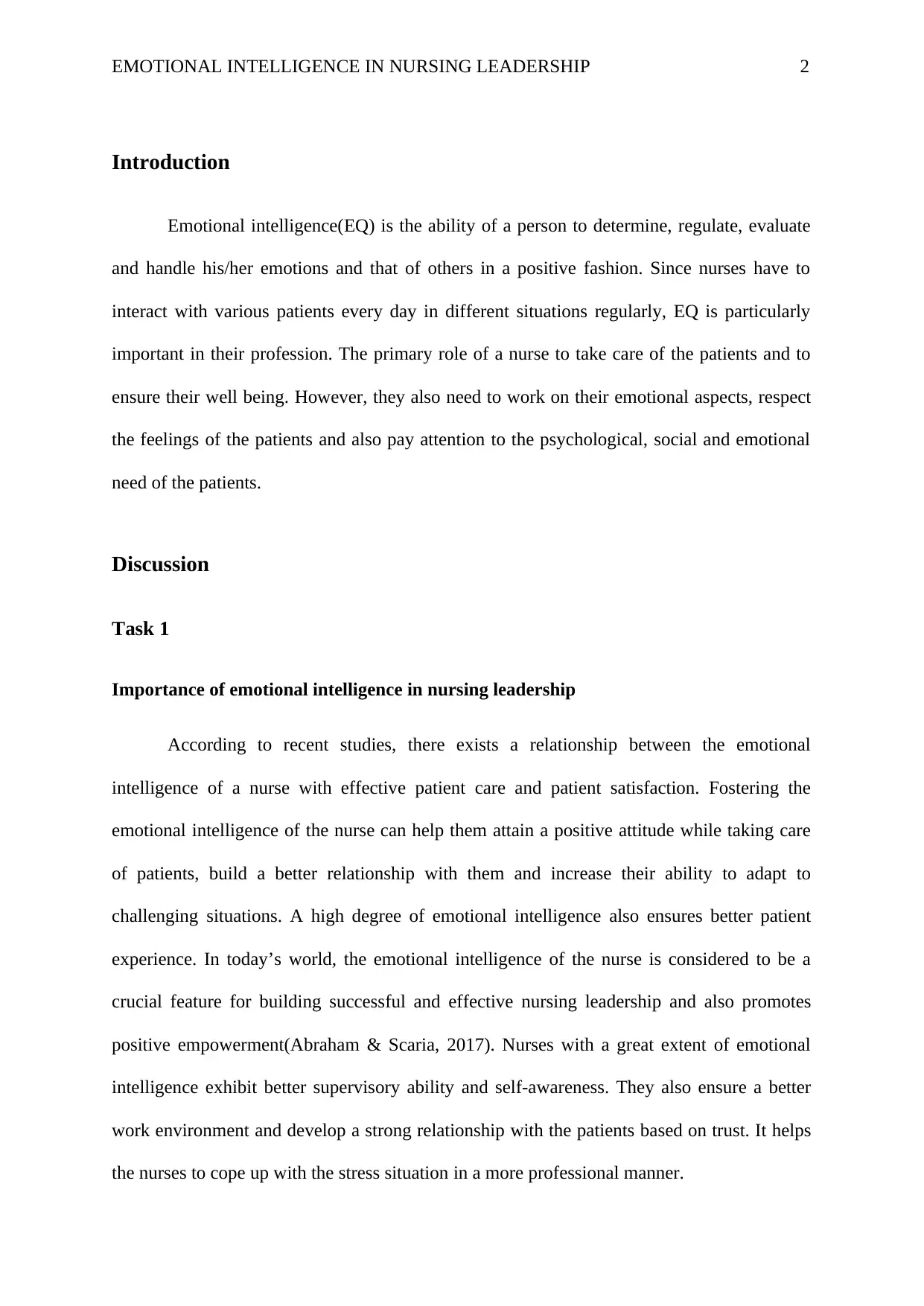
EMOTIONAL INTELLIGENCE IN NURSING LEADERSHIP 2
Introduction
Emotional intelligence(EQ) is the ability of a person to determine, regulate, evaluate
and handle his/her emotions and that of others in a positive fashion. Since nurses have to
interact with various patients every day in different situations regularly, EQ is particularly
important in their profession. The primary role of a nurse to take care of the patients and to
ensure their well being. However, they also need to work on their emotional aspects, respect
the feelings of the patients and also pay attention to the psychological, social and emotional
need of the patients.
Discussion
Task 1
Importance of emotional intelligence in nursing leadership
According to recent studies, there exists a relationship between the emotional
intelligence of a nurse with effective patient care and patient satisfaction. Fostering the
emotional intelligence of the nurse can help them attain a positive attitude while taking care
of patients, build a better relationship with them and increase their ability to adapt to
challenging situations. A high degree of emotional intelligence also ensures better patient
experience. In today’s world, the emotional intelligence of the nurse is considered to be a
crucial feature for building successful and effective nursing leadership and also promotes
positive empowerment(Abraham & Scaria, 2017). Nurses with a great extent of emotional
intelligence exhibit better supervisory ability and self-awareness. They also ensure a better
work environment and develop a strong relationship with the patients based on trust. It helps
the nurses to cope up with the stress situation in a more professional manner.
Introduction
Emotional intelligence(EQ) is the ability of a person to determine, regulate, evaluate
and handle his/her emotions and that of others in a positive fashion. Since nurses have to
interact with various patients every day in different situations regularly, EQ is particularly
important in their profession. The primary role of a nurse to take care of the patients and to
ensure their well being. However, they also need to work on their emotional aspects, respect
the feelings of the patients and also pay attention to the psychological, social and emotional
need of the patients.
Discussion
Task 1
Importance of emotional intelligence in nursing leadership
According to recent studies, there exists a relationship between the emotional
intelligence of a nurse with effective patient care and patient satisfaction. Fostering the
emotional intelligence of the nurse can help them attain a positive attitude while taking care
of patients, build a better relationship with them and increase their ability to adapt to
challenging situations. A high degree of emotional intelligence also ensures better patient
experience. In today’s world, the emotional intelligence of the nurse is considered to be a
crucial feature for building successful and effective nursing leadership and also promotes
positive empowerment(Abraham & Scaria, 2017). Nurses with a great extent of emotional
intelligence exhibit better supervisory ability and self-awareness. They also ensure a better
work environment and develop a strong relationship with the patients based on trust. It helps
the nurses to cope up with the stress situation in a more professional manner.
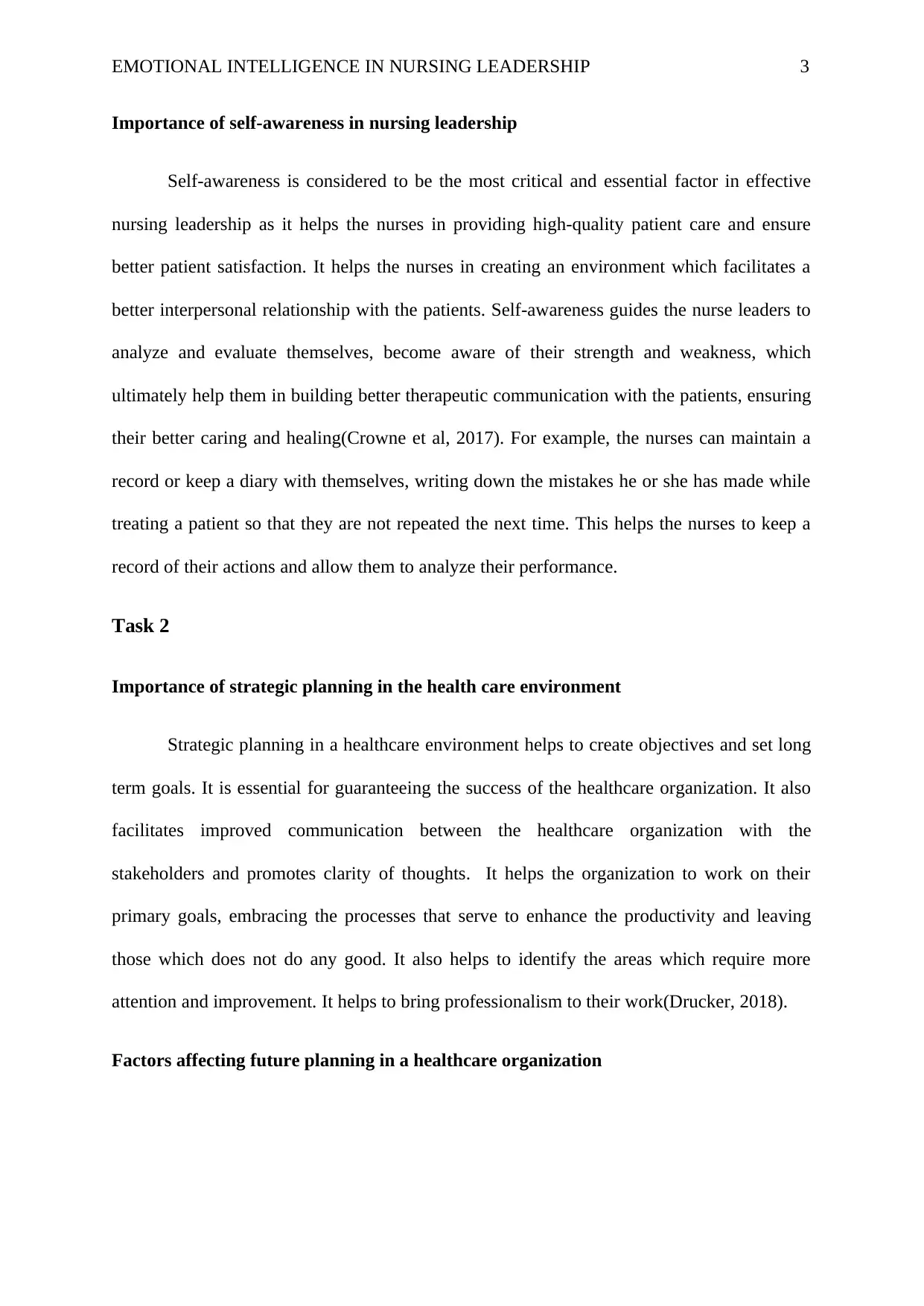
EMOTIONAL INTELLIGENCE IN NURSING LEADERSHIP 3
Importance of self-awareness in nursing leadership
Self-awareness is considered to be the most critical and essential factor in effective
nursing leadership as it helps the nurses in providing high-quality patient care and ensure
better patient satisfaction. It helps the nurses in creating an environment which facilitates a
better interpersonal relationship with the patients. Self-awareness guides the nurse leaders to
analyze and evaluate themselves, become aware of their strength and weakness, which
ultimately help them in building better therapeutic communication with the patients, ensuring
their better caring and healing(Crowne et al, 2017). For example, the nurses can maintain a
record or keep a diary with themselves, writing down the mistakes he or she has made while
treating a patient so that they are not repeated the next time. This helps the nurses to keep a
record of their actions and allow them to analyze their performance.
Task 2
Importance of strategic planning in the health care environment
Strategic planning in a healthcare environment helps to create objectives and set long
term goals. It is essential for guaranteeing the success of the healthcare organization. It also
facilitates improved communication between the healthcare organization with the
stakeholders and promotes clarity of thoughts. It helps the organization to work on their
primary goals, embracing the processes that serve to enhance the productivity and leaving
those which does not do any good. It also helps to identify the areas which require more
attention and improvement. It helps to bring professionalism to their work(Drucker, 2018).
Factors affecting future planning in a healthcare organization
Importance of self-awareness in nursing leadership
Self-awareness is considered to be the most critical and essential factor in effective
nursing leadership as it helps the nurses in providing high-quality patient care and ensure
better patient satisfaction. It helps the nurses in creating an environment which facilitates a
better interpersonal relationship with the patients. Self-awareness guides the nurse leaders to
analyze and evaluate themselves, become aware of their strength and weakness, which
ultimately help them in building better therapeutic communication with the patients, ensuring
their better caring and healing(Crowne et al, 2017). For example, the nurses can maintain a
record or keep a diary with themselves, writing down the mistakes he or she has made while
treating a patient so that they are not repeated the next time. This helps the nurses to keep a
record of their actions and allow them to analyze their performance.
Task 2
Importance of strategic planning in the health care environment
Strategic planning in a healthcare environment helps to create objectives and set long
term goals. It is essential for guaranteeing the success of the healthcare organization. It also
facilitates improved communication between the healthcare organization with the
stakeholders and promotes clarity of thoughts. It helps the organization to work on their
primary goals, embracing the processes that serve to enhance the productivity and leaving
those which does not do any good. It also helps to identify the areas which require more
attention and improvement. It helps to bring professionalism to their work(Drucker, 2018).
Factors affecting future planning in a healthcare organization
⊘ This is a preview!⊘
Do you want full access?
Subscribe today to unlock all pages.

Trusted by 1+ million students worldwide
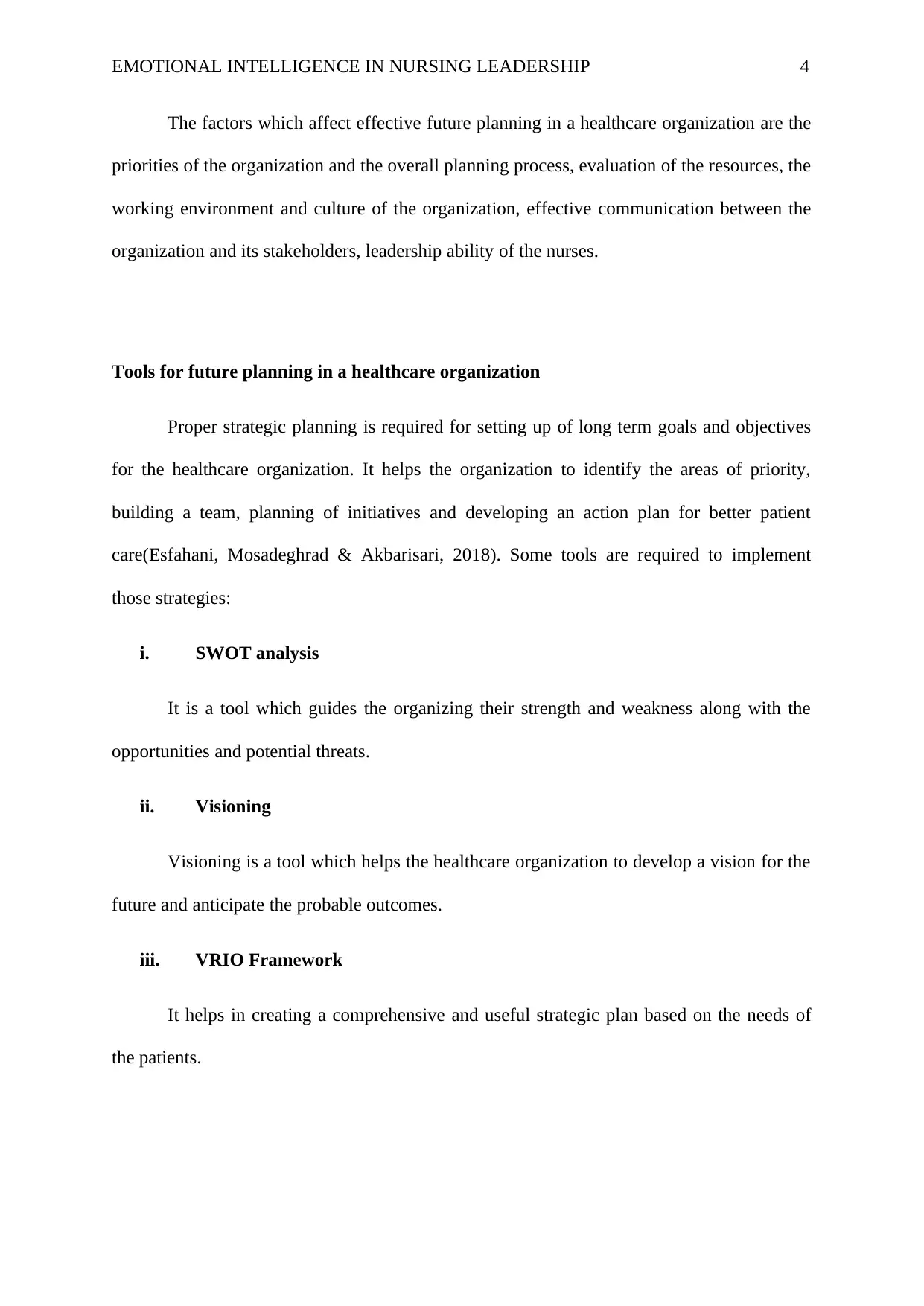
EMOTIONAL INTELLIGENCE IN NURSING LEADERSHIP 4
The factors which affect effective future planning in a healthcare organization are the
priorities of the organization and the overall planning process, evaluation of the resources, the
working environment and culture of the organization, effective communication between the
organization and its stakeholders, leadership ability of the nurses.
Tools for future planning in a healthcare organization
Proper strategic planning is required for setting up of long term goals and objectives
for the healthcare organization. It helps the organization to identify the areas of priority,
building a team, planning of initiatives and developing an action plan for better patient
care(Esfahani, Mosadeghrad & Akbarisari, 2018). Some tools are required to implement
those strategies:
i. SWOT analysis
It is a tool which guides the organizing their strength and weakness along with the
opportunities and potential threats.
ii. Visioning
Visioning is a tool which helps the healthcare organization to develop a vision for the
future and anticipate the probable outcomes.
iii. VRIO Framework
It helps in creating a comprehensive and useful strategic plan based on the needs of
the patients.
The factors which affect effective future planning in a healthcare organization are the
priorities of the organization and the overall planning process, evaluation of the resources, the
working environment and culture of the organization, effective communication between the
organization and its stakeholders, leadership ability of the nurses.
Tools for future planning in a healthcare organization
Proper strategic planning is required for setting up of long term goals and objectives
for the healthcare organization. It helps the organization to identify the areas of priority,
building a team, planning of initiatives and developing an action plan for better patient
care(Esfahani, Mosadeghrad & Akbarisari, 2018). Some tools are required to implement
those strategies:
i. SWOT analysis
It is a tool which guides the organizing their strength and weakness along with the
opportunities and potential threats.
ii. Visioning
Visioning is a tool which helps the healthcare organization to develop a vision for the
future and anticipate the probable outcomes.
iii. VRIO Framework
It helps in creating a comprehensive and useful strategic plan based on the needs of
the patients.
Paraphrase This Document
Need a fresh take? Get an instant paraphrase of this document with our AI Paraphraser
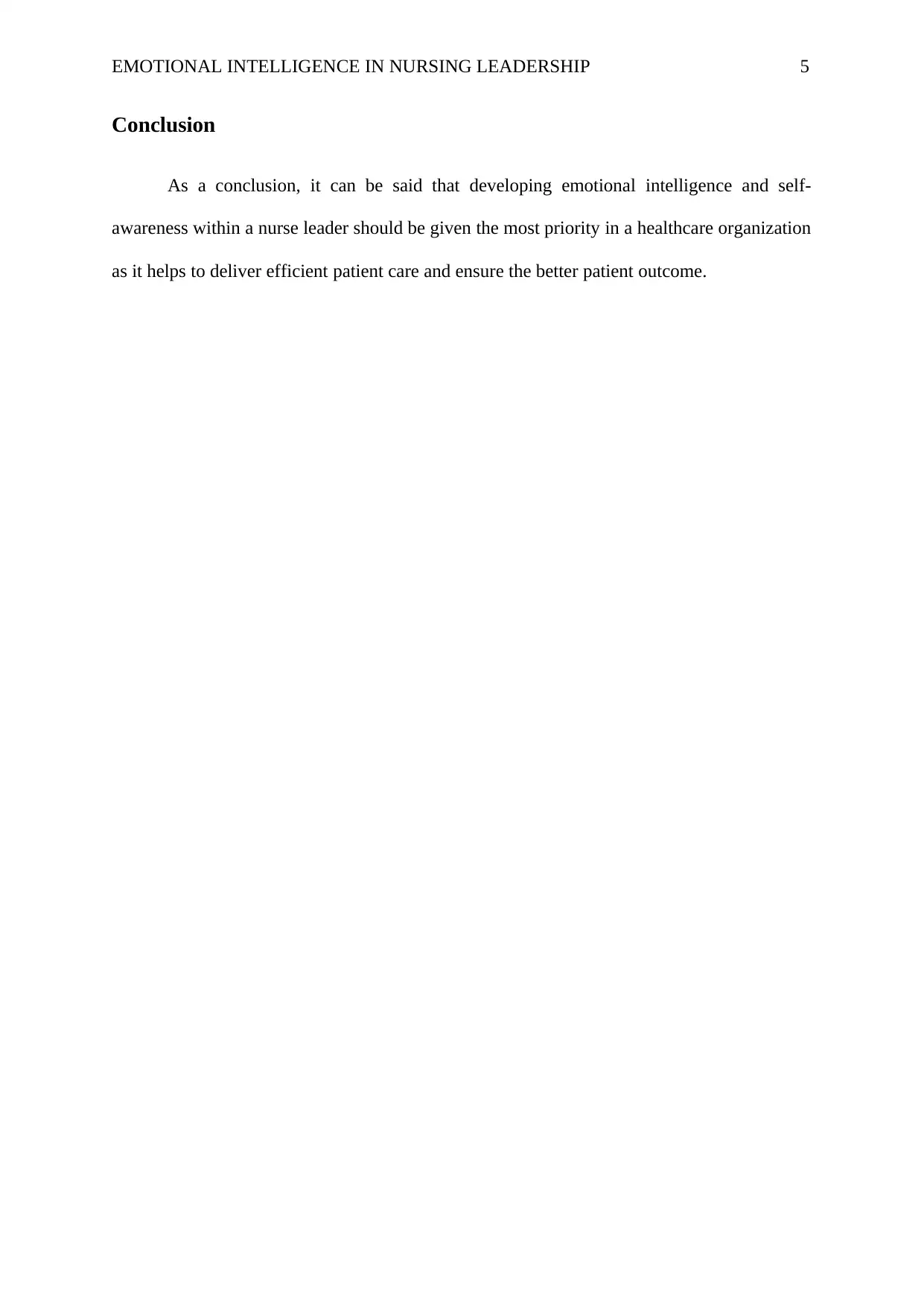
EMOTIONAL INTELLIGENCE IN NURSING LEADERSHIP 5
Conclusion
As a conclusion, it can be said that developing emotional intelligence and self-
awareness within a nurse leader should be given the most priority in a healthcare organization
as it helps to deliver efficient patient care and ensure the better patient outcome.
Conclusion
As a conclusion, it can be said that developing emotional intelligence and self-
awareness within a nurse leader should be given the most priority in a healthcare organization
as it helps to deliver efficient patient care and ensure the better patient outcome.
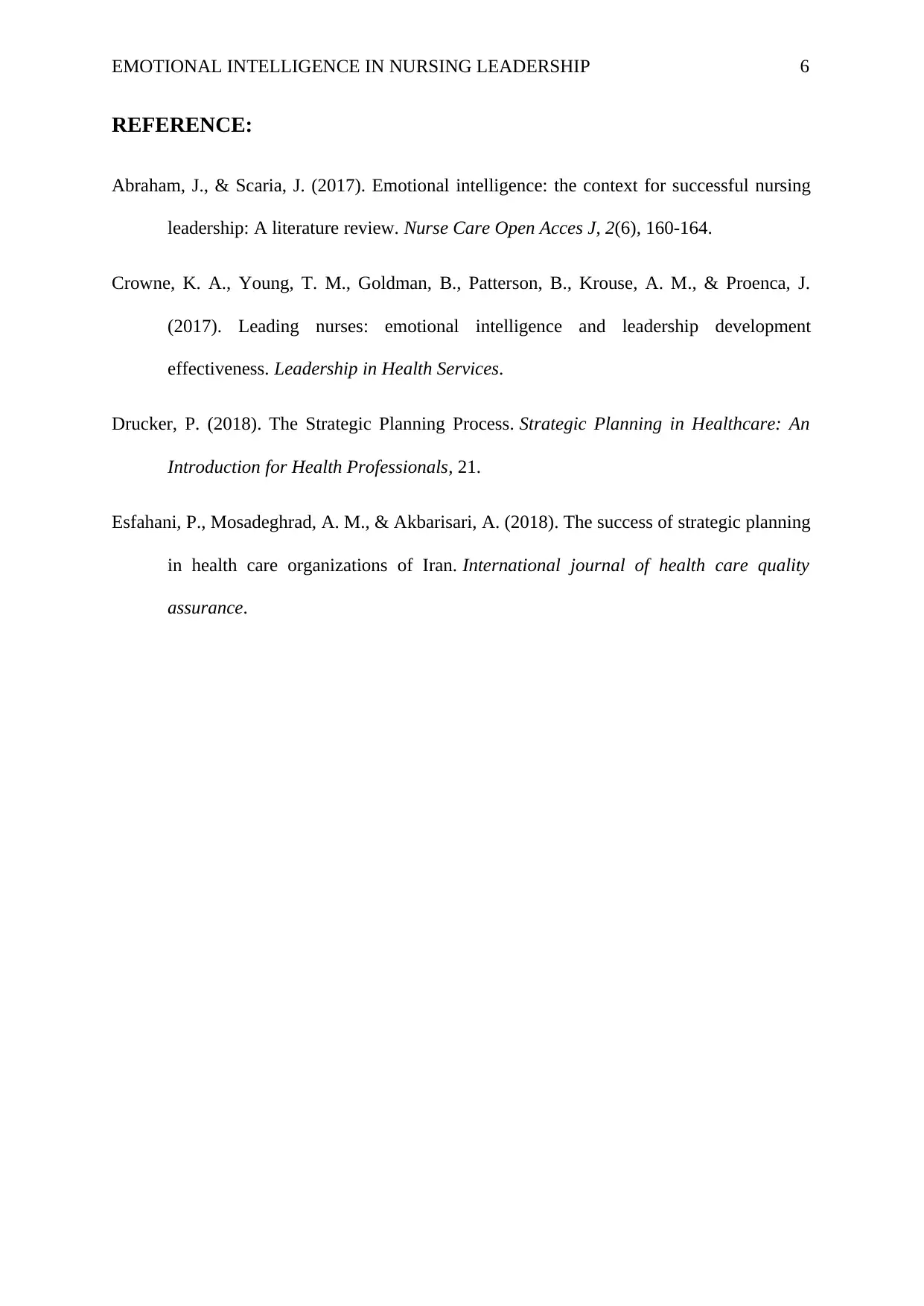
EMOTIONAL INTELLIGENCE IN NURSING LEADERSHIP 6
REFERENCE:
Abraham, J., & Scaria, J. (2017). Emotional intelligence: the context for successful nursing
leadership: A literature review. Nurse Care Open Acces J, 2(6), 160-164.
Crowne, K. A., Young, T. M., Goldman, B., Patterson, B., Krouse, A. M., & Proenca, J.
(2017). Leading nurses: emotional intelligence and leadership development
effectiveness. Leadership in Health Services.
Drucker, P. (2018). The Strategic Planning Process. Strategic Planning in Healthcare: An
Introduction for Health Professionals, 21.
Esfahani, P., Mosadeghrad, A. M., & Akbarisari, A. (2018). The success of strategic planning
in health care organizations of Iran. International journal of health care quality
assurance.
REFERENCE:
Abraham, J., & Scaria, J. (2017). Emotional intelligence: the context for successful nursing
leadership: A literature review. Nurse Care Open Acces J, 2(6), 160-164.
Crowne, K. A., Young, T. M., Goldman, B., Patterson, B., Krouse, A. M., & Proenca, J.
(2017). Leading nurses: emotional intelligence and leadership development
effectiveness. Leadership in Health Services.
Drucker, P. (2018). The Strategic Planning Process. Strategic Planning in Healthcare: An
Introduction for Health Professionals, 21.
Esfahani, P., Mosadeghrad, A. M., & Akbarisari, A. (2018). The success of strategic planning
in health care organizations of Iran. International journal of health care quality
assurance.
⊘ This is a preview!⊘
Do you want full access?
Subscribe today to unlock all pages.

Trusted by 1+ million students worldwide
1 out of 6
Related Documents
Your All-in-One AI-Powered Toolkit for Academic Success.
+13062052269
info@desklib.com
Available 24*7 on WhatsApp / Email
![[object Object]](/_next/static/media/star-bottom.7253800d.svg)
Unlock your academic potential
Copyright © 2020–2026 A2Z Services. All Rights Reserved. Developed and managed by ZUCOL.




